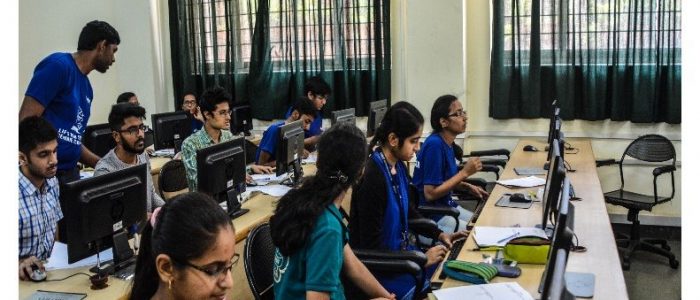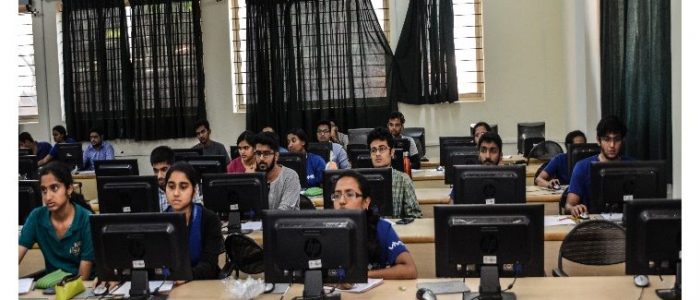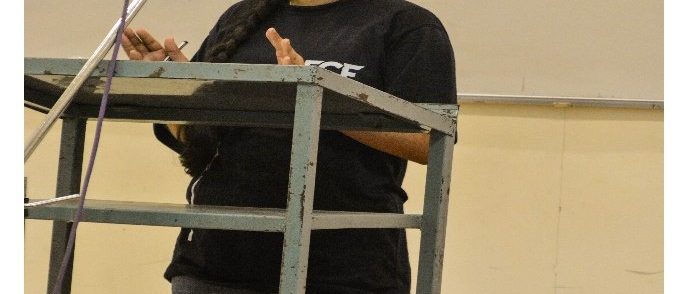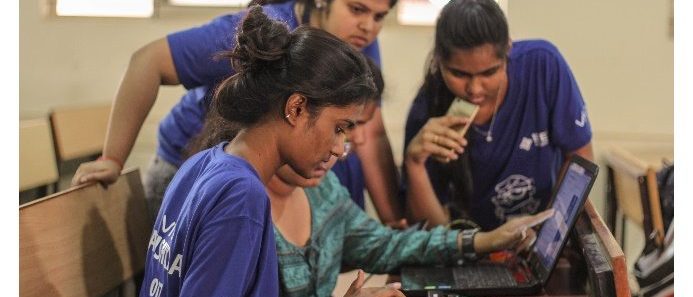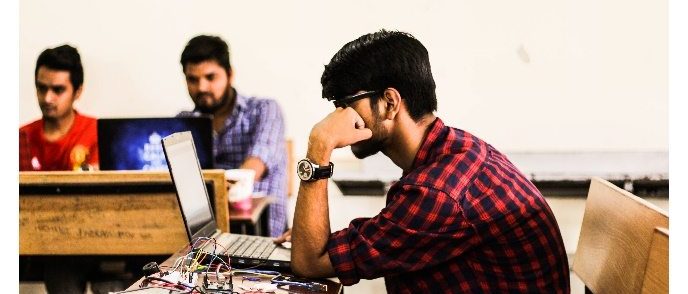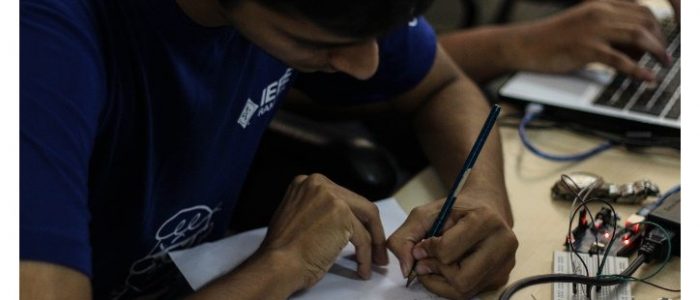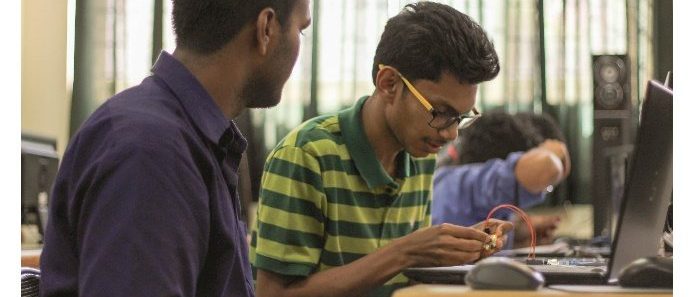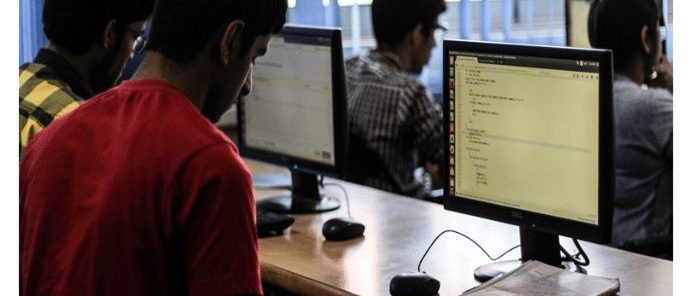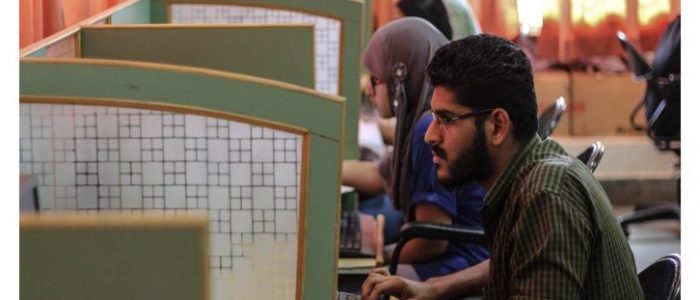Aavishkaar 2017
Aavishkaar was a 2-day technical fest conducted by IEEE RIT and presented by Vivo Camera and Music on 24th and 25th of March 2017. Several technical events encompassing various different fields of engineering were conducted and saw huge participation by students from various branches of engineering. The fest was a grand success with participants winning cash prizes, Vivo smartphones, etc. Aavishkaar was a 2-day technical fest conducted by IEEE RIT and presented by Vivo Camera and Music on 24th and 25th of March 2017. Several technical events encompassing various different fields of engineering were conducted and saw huge participation by students from various branches of engineering. The fest was a grand success with participants winning cash prizes, Vivo smartphones, etc.
-
Coding
Coding was held on March 24, 2017 at M S Ramaiah Institute of Technology conducted by Eshwar M S of 2nd year in Information Science and Engineering, MSRIT. The aim of the competition was to promote competitive coding among the students in 1st and 2nd year.It was scheduled at 2:00 PM on Friday, March 24, 2017 at CSE labs. Around 60 students participated in the competition.
Participants started coming as early as 1:30 PM. There were some on-spot registration to fill the remaining capacity. By 2:00 PM, all the participants were seated. Instructions were given and the competition kicked off as the link to the portal was live. The participants solved the coding questions for the next two hours, after which the results were out.
Puneeth N emerged victorious followed by Yashashree as runner-up.
The overall feedback received from the participants was positive. One of the feedback was to have a workshop for competitive coding. We will keep that in mind when hosting the competition next time.
-
Open – sourcing
This event was conducted on March 24th, 2017. The main coordinators of the event were Ravali, Anish, Manisha and Akansha. The event was organized in the Medical Electronics Lab.
Participation was open to all the semesters. The participants had to form a team of two. Around 14 teams had registered for the event and 11 of them participated.
The event was as follows:
- Participants were given prior instruction to bring their own Arduino and install the IDE in their laptops before the commencement of the competition
- At the start of the event, the participants were given a set of tasks and were allotted a fixed time of 90 minutes to complete as many tasks as possible
- The tasks designed were of varying complexity. Based upon the complexity of the problem, marks were allotted
- The participants were assigned to implement the tasks using the Arduino. The participants were free to use the codes available in the Arduino library. Also, the participants had the freedom to choose whichever task they wished to implement first
- All the components except the Arduino were provided by IEEE
- The team which completed the most number of complex tasks in the least time were declared as the winners
- The winners of the event were:
- First Prize – Krishna and Taksh
- Second Prize – Murali Manohar and Aditya S Patil
- Third Prize – Suhas Suresh and Richard P D
-
Hackatronics
Hackatronics was a day-long event held on 25th of March 2017 in LHC block. In total 17 teams participated, each consisting of 4 members. It was a challenging technical competition which required skills in electronic circuits, communication, programming, etc.
The participants had to come up with an interesting and innovative idea, and build a prototype for the same within 8hrs. Evaluation was based on novelty of the solution, working of prototype and practicality of the approach. Few of the concepts that were explored by the participants were Home Automation, Radar-based surveillance, Obstacle Avoider with gesture control, Smart rooms and many more.
One basic rule of the competition was that all teams were given 120 points in virtual currency which was to be used for buying the required components from the booth put up.
Murali and team bagged the First prize for their ‘Smart Wastage Management’ which consisted of a smart street lamp, garbage carrier that empties trash cans placed along the road and also waters plants planted on either side of the road.
Eshwar and team were declared runners-up for developing a gesture controlled racing game which could be played by wearing a pair of smart gloves that was developed by the team.
-
Line follower Robot Competition
Line follower is an autonomous robot which follows either a black line in white area or white line in black area. Robot must be able to detect particular line and keep following it. For special situations such as cross overs where robot can have more than one path which can be followed, predefined path must be followed by the robot.
This interesting competition was organized at MSRIT during the technical fest AAVISHKAAR held on 24th and 25th of March 2017.The competition saw a total of 7 teams participate and battle against each other to win the title. The competition comprised of two rounds.
Objective of the First round was to simply traverse the given track using the autonomous robot and the criteria for selection to the next round was the time taken to complete the track. Three teams made it to the second and final round. In this round, the teams were presented with a difficult path and the criteria for judging was the accuracy of the robots in following the black line, time taken to complete the task and for each time the robot went out of track a penalty of 5 sec was added to the total time of completion of the task.
The teams exceeded the expectations of one and all, and the level of competition was immense. After two hours of fighting it out, two teams were adjudged as the best teams based on the above-mentioned criteria. The first prize was bagged by Pradeep and team, while Rajni and team emerged as runners-up.
-
Tech Debate
Tech Debate was conducted on the second day of Aavishkaar 2017. It had students from different branches of Engineering participating in it. The topic given was “The development of artificial intelligence will prove to be a threat to the society”. The event was coordinated by Nikitha R N, Final year, ECE.
The topic was given to the participants one hour prior to the event. They were expected to either speak for or against the motion. Each participant was given four minutes to speak and a minute for rebuttal by the audience. The judge for the event was Atyasha Sinha, an eminent speaker from DEBSOC, MSRIT’s debating society.
One could witness war of words as each participant stood their ground passionately. We also had two of our alumni putting forth their elegant views. At the end of the event Pragyandipta, a student from second year, Mech. was declared the best speaker and Divyansh Lomia, the runner-up.
The tech debate was a huge success as at the end of the event the audience could appreciate the power of artificial intelligence and also understand that it could prove to be a bane to the society.
-
Tech Quiz
The event which was held on the first day of Aavishkaar, was divided into 6 rounds.
1. Prelims
2. The category
3. Pounce
4. The connect
5. Bidding
6. Rapid fire!
The LHC seminar hall, where it was conducted, was packed with over 30 teams and a large audience as well as volunteers and photographers. Each team had a maximum of 2 members. The event kicked off with prelims hosted by Hazique Kola, who was the quiz master for the evening. There were 24 questions, of which 8 were starred questions, used as Tie-Breakers in case the need arose. This was a written round and the results served as the deciding factor for qualification to the next round. After a very close set of scores, which involved us needing to cross check every answer as well as using all the starred question to break ties, six teams emerged on top and thus managed to qualify to the following rounds. The following rounds were conducted with equal pace. The category involved teams choosing from a list of available categories based on their scores from the previous round. This round had no negative marking and was a tightly fought battle between the six teams.
Pounce was one of the riskier rounds for the participants since each team stood to lose a lot with each wrong answer on the pounce. This round witnessed extremely cautious as well as risky plays by all the teams on stage with each trying to get ahead of the other’s scores. In the midst of all this, there were a number of questions prepared specially to keep the audience enthralled and all correct answers were rewarded with chocolates. The bidding round involved teams bidding for their answers and a number of teams found themselves on opposite sides of the leaderboard at the end of this round. This also served as an elimination round for the next set. At the end, four teams were selected for the last and final round. The final round was rapid fire, which had a time limit of 2 minutes, with 20 questions to answer.
After a hard-fought battle, the team composed of Milind and Riya emerged as Runners Up, while leading very closely, Sujay and Syed came out on top and were declared the winners. The event with all its rounds was carried out as per the schedule and ended by 6:30, due in no small part, to the contributions of the ever enthusiastic volunteers and the quiz master as well as the quizzing and tech team that supported him.
-
Debugging
Debugging is a technical contest in which the contestants have to identify errors (bugs) in the given code. It was a one-hour contest held between 1pm to 2pm at the Medical Software Lab, MSRIT. It was an individual event which was conducted in two stages.
Stage 1 was a multiple-choice question (mcq) round which consisted of 10 questions, each having 4 options out of which exactly one option was correct. The correct answer fetched the contestant +3 points and a wrong choice fetched –1 points. There was no penalty for unattempted questions. This stage was offline without access to a computer.
Stage 2 was a code debugging round which consisted of 8 C programs. Each program consisted of a description, sample input and sample output along with the code to be debugged. Each working program satisfying all constraints provided in the description was awarded +10 points. No negative points shall be given for wrong solutions or unattempted questions. The contestants could use the tutorialspoint IDE or codechef IDE to test help debug and test their solutions in the system allotted to them. No other written material or access to other debuggers or internet was allowed.
Judging was based on the scores and time taken to complete was considered for breaking ties. The winners’ details are as follows:
First place: Amogh (CSE 3rd year, MSRIT)
Runner Up: Jitesh Kumar (ISE 3rd year, MSRIT)
-
Password
Password was held on the first day of Aavishkaar and it was organized by Lesslin Dias along with several volunteers. It consisted of 4 rounds. The rounds in order were:
- Dumb Charades – Participants, in groups of 3, were allotted 2 minutes to guess as many words as possible. One representative from a group would pick the chit and enact the word or words on it for their teammates to guess. A participant could skip upto 3 chits upon which the next member of their group would have to enact the words. Once 9 chits were passed, the team would be disqualified. Venue: LHC Seminar Hall
- Blind Typing – 2 participants from each group would participate in this event. One of the participants was blindfolded. The other participant had to direct their teammate to attempt a typing test for a duration of 1 minute. The team’s accuracy, and words per minute were judged. Venue: Computer lab above canteen
- Quiz – Consisted of logical and general knowledge questions.
- Password – One participant would look at a chit and would give their teammates a one-word hint to try and guess what is written on the chit.

